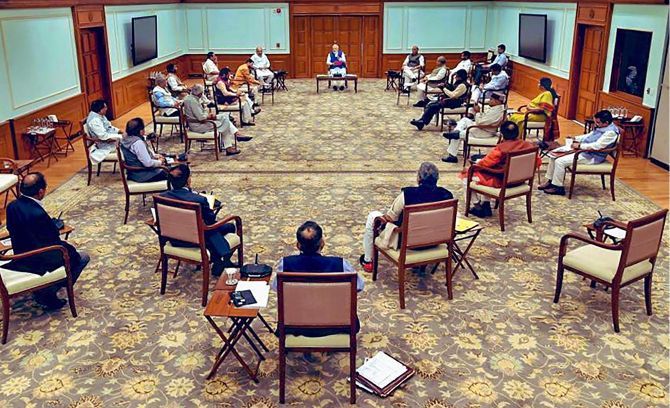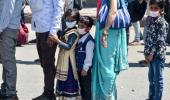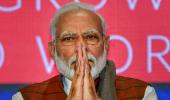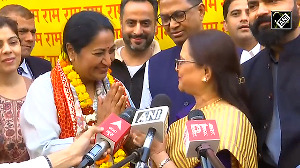Only a leader with sufficient moral authority with voters can pull off such experiments, notes T N Ninan.

Of the seven countries that have more than 10,000 cases of COVID-19, four are the largest economies of continental Europe: Italy, Germany, France and Spain.
Other than China, the source of the virus outbreak, Asia has one country in the list: Iran.
The seventh country in the 10,000+ list is the United States.
As for the nine countries that have between 1,000 and 10,000 cases, all but one are also in Europe (the solitary Asian country on this second list is South Korea).
The other Asian countries with the largest populations (India, Indonesia, Japan) have relatively few cases so far.
If India were to follow Europe's trajectory, relative to population, it would have a couple of lakh affected, and an unmanageable crisis, whereas China has probably peaked at about 80,000 cases.
As for other continents, Africa, with a population slightly smaller than India's, has four or five times the number of COVID-19 cases reported so far.
Latin America, with half India's population, has more than 10 times India's number of cases.
This is a radically different experience from earlier virus epidemics, which mostly affected people in the country or continent where they originated.
The Ebola virus outbreak of 2014, which originated in West Africa, claimed most of its victims from that continent.
Similarly, the SARS (severe acute respiratory syndrome) outbreak of 2003 saw 90 per cent of the 8,000 affected being from China (the originating point) and Hong Kong; those affected in Europe and North America were only in the hundreds.
And the overwhelming majority of those affected by HIV-Aids have been in Africa, the source of the outbreak.
COVID-19 is very different in the pattern thus far of who gets hit most.
This must surprise.
The East Asian region, with its dense aviation network, would ordinarily be considered more vulnerable because of its more limited medical resources, more crowded habitations, and poorer public health standards.
These factors may still come into play.
South Korea has followed one approach by doing widespread testing.
It consequently has larger numbers reported; early discovery has helped take action to control the problem.
In contrast, India and Japan are said to have under-tested for the disease, as has the United States.
Their numbers could explode once testing is stepped up.
Indeed, India's numbers are beginning to show signs of the same exponential growth that has been recorded elsewhere.
So it is just as well that the prime minister has upped the ante with a national broadcast in which he warned that India would not escape lightly, and focused on taking the fight beyond what governments can do, and on making citizens responsible for their own well-being.
The game is prevention, since mitigation efforts following any spread of the disease to epidemic scale would be hampered by inadequate medical resources.
If it works, it would be Narendra Damodardas Modi's second successful experiment in social mobilisation.
The first such exercise by Mr Modi was his campaign asking better-off consumers to voluntarily give up their access to subsidised cooking gas cylinders.
Larger and faster exclusions from the subsidy regime could have been achieved through direct government action, but Mr Modi chose to ask people to volunteer -- and followed it up by saying that the money saved would go to a worthy cause.
Only a leader with sufficient moral authority with voters can pull off such experiments.
In a limited way this harks back to some features of the freedom movement.
As another variant, Mao's China was also known for its social mobilisation, with the added element of coercion, and underlines the point that this can be a double-edged sword.












 © 2025
© 2025